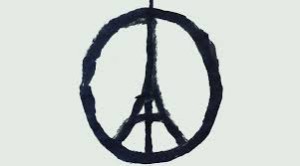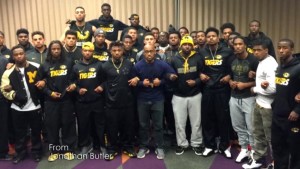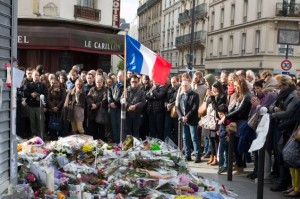On the night of Friday, November 13th, a series of coordinated terrorist attacks – suicide bombings and mass shootings – occurred in and just-outside of Paris. Responsibility for these attacks was claimed by the Islamic State of Iraq and the Levant (ISIL), allegedly in retaliation for French airstrikes on ISIL targets in Syria and Iraq. All told, 368 people were wounded, and 130 were killed. It was the deadliest attack on France since World War II.
Most of you readers will already know all of this – at least the gist of it, anyway. I’m not here to detail the logistics of what happened, or chronicle its aftermath. That has been done at length by those far more informed and well connected than I. What I want to instead address is something I’m more familiar with than murderous terrorist activity: the reactions to said activity on social media.
As is unfortunately the case, events of this horrific ilk occur often in our world; just in 2015 alone, we had:
- The Paris attack
- The Charleston Church shooting by Dylan Roof, seemingly caused by white-supremacist motivations
- The Planned Parenthood shooting in Colorado Springs
- The San Bernadino shooting
In fact, there were 57 mass shootings (3+ killed) in the U.S. alone this year. That’s more than one per week.
A lot of other emotionally-charged things took place this year, too – the Black Lives Matter movement, the Syrian Refugee crisis, and the U of Missouri protests to name just a few – but in this particular context, it’s important to concentrate solely on mass shootings specifically because:
- Public opinion of them tends to be entirely one-sided
- They cause a massive public outcry on social media
 The Paris attacks in particular prompted many to take to their Facebook, Twitter, Instagram, etc. accounts to show their support for and outrage at such a tragedy. There was ubiquitous re-tweeting of a sketch of the Eiffel Tower that wasn’t drawn by Banksy. Sanctimonious comments emerged, such as:
The Paris attacks in particular prompted many to take to their Facebook, Twitter, Instagram, etc. accounts to show their support for and outrage at such a tragedy. There was ubiquitous re-tweeting of a sketch of the Eiffel Tower that wasn’t drawn by Banksy. Sanctimonious comments emerged, such as:
“Shocked & saddened by terrorist attacks on #Paris. Standing with #France… Our thoughts are w you.”
NBC’s The Today Show tweeted out, “Paris pausing for a moment of silence. #PrayForParis.”
My newsfeed was dominated by profile pictures infused with the red, white and blue of the French flag, expressing how disheartened, saddened, disgusted, dismayed, upset, hurt, shocked, outraged, angry, riled up, frustrated, et al. they were. When I started to notice that, without exception, everyone was basically conveying the exact same sentiment as everyone else, I began to wonder why, really, they were then communicating it in the first place. After all, though violent acts of terrorism are deeply unsettling and unnerving, they are far from controversial, in the strict sense of the word. A stance did not need to be taken; there’s only one side to this debate.
Oh, so you’re against the unwarranted murder of innocent civilians? No shit.
Furthermore, my educated guess is that most people appearing on my newsfeed don’t know anyone who lives in France or was directly influenced by the Paris attacks – they’re not really providing moral support to someone who actually needs it. Basically, what they are doing is expressing a feeling that everybody else already feels, in a way that won’t actually reach anyone involved.
So my question is Why? Why do people feel the need to post these humane but no-brainer things? What’s the motivation for doing this?
My immediate read, which you can probably chalk up to my cynical-by-default nature, is that most of these social media proclamations are driven by misguided narcissism. Yes, people feel outraged by public tragedies and want to support the victims and their families, but they also want to make sure their peers are aware they are the type of people who feel outraged at public tragedies and want to support the victims and their families. Sort of a “hey look at me and how good of a person I am” kind of thing.
If social media became an anonymized forum, where users never received personal credit for their anti-terrorist “picketing,” my guess is that we would see a lot less of that behavior.
As true as that probably is, I think there’s a more genuine way to read these actions, which is that public tragedies shake people emotionally, creating some unconscious desire to reach out to and be embraced by their community; these events are deeply troubling, even if you aren’t directly involved in them at all, and it can make one feel better to get in touch with others who can empathize because they feel the same way. Social media is an outlet to turn to in those situations, a place where others can respond and relate to your emotions.
At the end of the day, there are probably feelings of both isolation and selfishness at play, but regardless, I think what’s interesting to think about is the outcome of all this chatter. This is because, at least on the surface, there just doesn’t seem to be any real yield from partaking in this type of internet flag-waving, other than making yourself, and perhaps others in your social network, feel better about what’s happened. Perhaps there is some positive effect where the families of the victims appreciate the overall tide of support? I’m not really sure.
 There is one under-the-radar effect I think the overall phenomenon creates, though, and that is a sort of positive peer pressure. After all, though things like terrorist attacks and racism strike the majority of us a priori as categorically immoral, obviously not everybody feels that way. Even in today’s progressive society, people at the University of Missouri still yell racial slurs from their trucks at African Americans passing by. Muslim radicals still unload automatic weapons into packed concert venues. People like Adam Lanza walk into Sandy Hook Elementary and slaughter 20 young children.
There is one under-the-radar effect I think the overall phenomenon creates, though, and that is a sort of positive peer pressure. After all, though things like terrorist attacks and racism strike the majority of us a priori as categorically immoral, obviously not everybody feels that way. Even in today’s progressive society, people at the University of Missouri still yell racial slurs from their trucks at African Americans passing by. Muslim radicals still unload automatic weapons into packed concert venues. People like Adam Lanza walk into Sandy Hook Elementary and slaughter 20 young children.
Not everybody is wired like you and me.
But perhaps if people use Facebook accounts to protest these abominations, someone who would have been an extremist will read enough posts to come to his/her senses and decide to not commit the act s/he otherwise would have. Even if s/he is stopped only by some weird sense of public shaming, that would still be better. Social media, in essence, could act as this sort of cloud-based Superego, trumping what the Id feels it needs to do.
So next time something horrible happens – it’s really and unfortunately a question of when, not if – I’ll probably still roll my eyes at the 395 self-righteous posts on my newsfeed. But I’ll also hope that, despite these individuals engaging in this behavior really for themselves, the collective will, unseen, and maybe just in the tiniest way, benefit us all.

